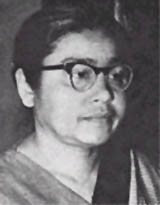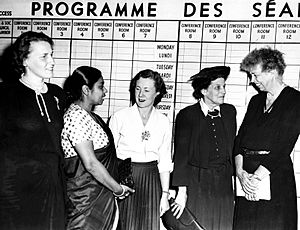Sucheta Kripalani facts for kids
Quick facts for kids
Sucheta Kripalani
|
|
|---|---|
 |
|
| 4th Chief Minister of Uttar Pradesh | |
| In office 2 October 1963 – 13 March 1967 |
|
| Governor | Bishwanath Das |
| Preceded by | Chandra Bhanu Gupta |
| Succeeded by | Chandra Bhanu Gupta |
| Member of Parliament (Lok Sabha) | |
| In office 1967–1971 |
|
| Preceded by | N. Dandekar |
| Succeeded by | Anand Singh |
| Constituency | Gonda |
| MLA in Legislative Assembly of Uttar Pradesh | |
| In office 1962–1967 |
|
| Succeeded by | Chandra Sekhar Singh |
| Constituency | Menhdawal |
| Member of Parliament (Lok Sabha) | |
| In office 1951–1961 |
|
| Preceded by | constituency established |
| Succeeded by | Balraj Madhok |
| Constituency | New Delhi |
| Member of Constituent Assembly of India | |
| In office 9 December 1946 – 24 January 1950 |
|
| Personal details | |
| Born | 25 June 1908 Ambala, Punjab, British India (present-day Haryana, India) |
| Died | 1 December 1974 (aged 66) New Delhi, India |
| Political party | INC |
| Spouse | J. B. Kripalani |
| Alma mater | University of Delhi |
Sucheta Kripalani, born Sucheta Mazumdar (June 25, 1908 – December 1, 1974), was a brave Indian freedom fighter and a very important politician. She made history by becoming India's first woman Chief Minister. She led the government of Uttar Pradesh from 1963 to 1967.
Contents
Early Life and Growing Up
Sucheta was born in Ambala, a city in Punjab (which is now part of Haryana). Her family was Bengali and followed the Brahmo faith. Her father, Surendranath Majumdar, was a doctor. His job meant the family moved around a lot.
School Days and Big Ideas
Because her family moved often, Sucheta went to many different schools. She earned a Master's degree in History from St. Stephen’s College in Delhi. This was a time when India was buzzing with strong feelings of nationalism. People wanted their country to be free from British rule.
Sucheta was a shy child. She even wrote in her book, An Unfinished Autobiography, that she felt unsure about herself. But the events happening around her helped shape her into a strong person.
A Spark of Courage
When Sucheta was just 10 years old, she heard her father and his friends talking about the terrible Jallianwala Bagh massacre. This event made her and her siblings very angry. They even showed their anger by calling names to some Anglo-Indian children they played with.
Sucheta remembered feeling "great anger against the British" after hearing about the massacre. She and her sister, Sulekha, were desperate to join India's fight for freedom.
Standing Up for Beliefs
Sucheta shared another interesting story from her youth. When the Prince of Wales visited Delhi, girls from her school had to stand and honor him. Even though Sucheta and her sister didn't want to, they felt they couldn't refuse. This made them feel ashamed of their "cowardice."
Later, while studying at Kinnaird College for Women in Lahore, her Bible teacher said some unkind things about Hinduism. Sucheta and Sulekha were furious. They went home, and their father helped them learn about their own religion. The next day, they bravely used quotes from the Bhagavad Gita to challenge their teacher. After that, the teacher never spoke badly about Hinduism again!
Sucheta studied at Indraprastha College and Punjabi University before becoming a history professor. In 1936, she married J. B. Kripalani, a well-known leader of the Indian National Congress. He was 20 years older than her. Both their families, and even Mahatma Gandhi, were against the marriage at first. But eventually, they agreed.
Fighting for Freedom and India's Independence
Sucheta Kripalani became a key figure in the Quit India Movement. This was a big protest against British rule. Like other brave women such as Aruna Asaf Ali, she was arrested by the British for her actions.
Working with Mahatma Gandhi
After being released, Sucheta worked very closely with Mahatma Gandhi. She helped him during the difficult times of the Partition of India riots in 1946. Gandhi himself praised her, calling her "a person of rare courage and character."
Helping Shape India's Future
Sucheta was one of the few women chosen to be part of the Constituent Assembly of India. This group was responsible for writing the Indian Constitution. She helped create the rules for how India would be governed.
On August 14, 1947, just before India gained independence, Sucheta sang Vande Mataram in the Constituent Assembly. This was moments before Jawaharlal Nehru gave his famous "Tryst with Destiny" speech. She also started the All India Mahilla Congress in 1940, an organization for women in politics.
After India Became Independent
After India gained its freedom, Sucheta Kripalani continued to be active in politics.
Her Political Journey
In 1952, she ran for the 1st Lok Sabha (India's main parliament) from New Delhi. She was part of a new party called the KMPP, which her husband had started. She won against the Congress candidate. Five years later, she won again from the same area, but this time as a Congress candidate. Her last election to the Lok Sabha was in 1967, from the Gonda constituency in Uttar Pradesh.
First Woman Chief Minister
Sucheta also became a member of the Uttar Pradesh Legislative Assembly. From 1960 to 1963, she served as a minister in the UP government, handling areas like Labor and Industry. Then, in October 1963, she made history. She became the Chief Minister of Uttar Pradesh, the very first woman to hold this top position in any Indian state!
One important event during her time as Chief Minister was a big strike by state employees. This strike lasted for 62 days. Sucheta was a very firm leader. She only agreed to talk when the employees' leaders were ready to compromise. She refused their demand for a pay raise, showing her strong leadership.
In 1969, the Congress party split. Sucheta left with one group and formed a new party called NCO. She lost the election in 1971 as an NCO candidate. After that, she retired from politics in 1971 and lived a quiet life until her death in 1974.
 | Laphonza Butler |
 | Daisy Bates |
 | Elizabeth Piper Ensley |


